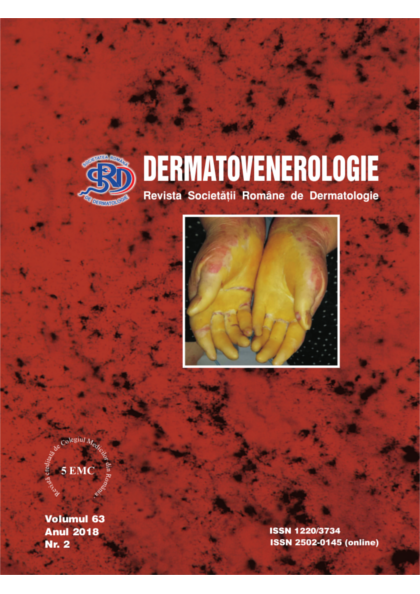Introduction
Linear Lichen Planus Pigmentosus (LPP) is a rare
form of lichen planus characterized by macular or papulous,
hyperpigmented, dark brown lesions, in plaque or crosslinked,
asymptomatic with blaschkoid localization.
Case Study
We present the case of a 50-year-old patient, diagnosed
with lichen planopilaris, three months ago, who addressed
our clinic for the appearance of new, discreetly atrophic
maculo-pigmentary lesions with blaschkoid distribution in
the hemicranium and left hemifacial area, as well as because
of the persistence of scalp lesions. The illness started at the
same time with a dental treatment on the upper left dental
arcade. The patient followed systemic antihistamine and
topical corticosteroid treatment without significant clinical
effects. The histopathological examination reveals
hyperkeratosis, irregular hypergranulosis acanthosis,
hyaline corpusculary diskeratosis, and basal strain
remodelling. Histopathological aspects plead for the
diagnosis of LPP.
Discussions
LPP is described as an unknown aetiology disorder,
different from the classical lichen planus, through lesion
morphology and the absence of subjective symptomatology.
A particular feature of the disease is the lack of interest in
the scalp, nails and mucous membranes. The disease occurs
frequently in the middle age, with a peak incidence in
decade 3-4 of life. The case presented shows a particular
image of LPP associating blaschkoid distribution lesions,
rare clinical variant, with unknown prevalence.
Conclusions
The particularity of this case is the blaschkoid
distribution of typical lesions of lichen planopilaris and
subsequent pigmentary macules in the left hemifacial and
left submental area. The traumatic etiopathogenesis of
lichen planopilaris is a relatively rare occurrence in current
clinical practice.Linear LPP does not have a standardized
treatment due to the rarity of cases, but in the case of our
patient, the combination of Elidel 1% cream with Regen sil
resulted in a mild clinical improvement after 6 weeks of
treatment.


